Coated Seamless Gloves
Essential Hand Protection: Nitrile, PU, Latex Coated Gloves and more
Explore our wide selection of coated seamless gloves, designed with a focus on safety and comfort. Engineered to protect against various workplace hazards like chemical exposure and abrasions, these gloves offer a reliable defense. With a diverse range of coating options, such as latex, polyurethane, and nitrile, finding the ideal fit for your requirements is effortless. Choose Liberty Safety's coated seamless work gloves—a durable, flexible, and essential solution crafted to excel in any work environment.
Explore our wide selection of coated seamless gloves, designed with a focus on safety and comfort. Engineered to protect against various workplace hazards like chemical exposure and abrasions, these gloves offer a reliable defense. With a diverse range of coating options, such as latex, polyurethane, and nitrile, finding the ideal fit for your requirements is effortless. Choose Liberty Safety’s coated seamless work gloves—a durable, flexible, and essential solution crafted to excel in any work environment.
Showing 1–20 of 49 results
-
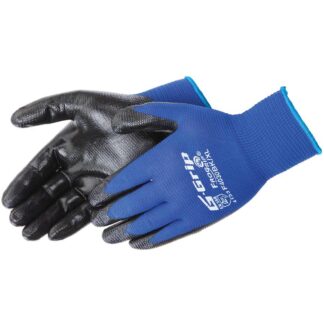 F4030BK
F4030BKG-Grip™
13 Gauge Black Foam Nitrile Coated Seamless Gloves
-
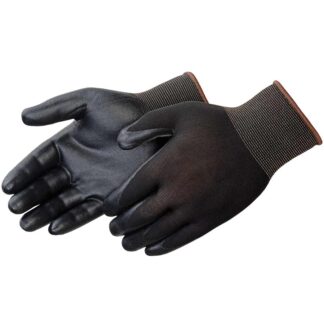 F4631BK
F4631BKG-Grip™
13 Gauge Black Foam Nitrile Coated Seamless Gloves
-
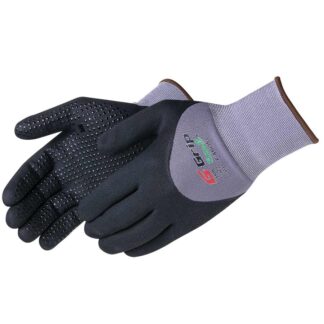 F4605
F4605G-Grip™
15 Black Microfoam Nitrile 3/4 Coated Seamless Gloves
-
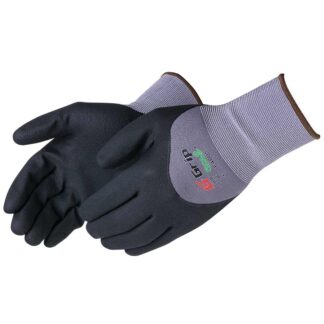 F4601
F4601G-Grip™
15 Gauge Black Microfoam Nitrile 3/4 Coated Seamless Gloves
-
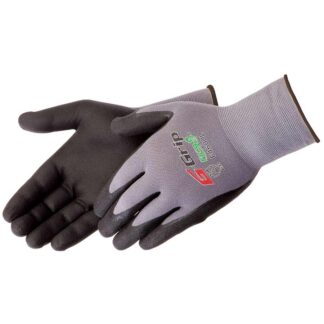 F4600
F4600G-Grip™
15 Gauge Black Microfoam Nitrile Coated Seamless Gloves
-
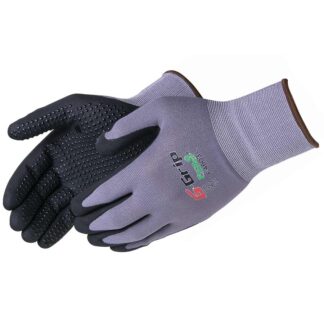 F4603
F4603G-Grip™
15 Gauge Black Microfoam Nitrile Coated Seamless Gloves
-
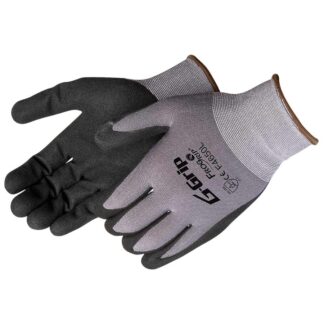 F4650
F4650G-Grip™
15 Gauge Black Sandy Nitrile Coated Seamless Gloves
-
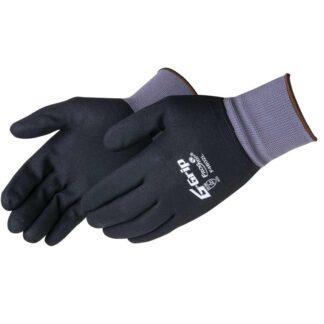 F4602
F4602G-Grip™
15 Gauge Fully Black Microfoam Nitrile Coated Seamless Gloves
-
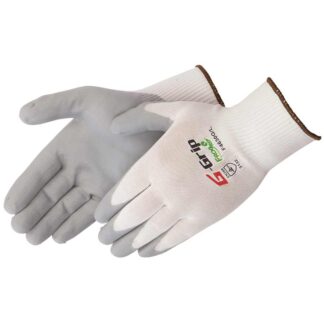 F4630G
F4630GG-Grip™
15 Gauge Gray Nitrile Coated Seamless Gloves
-
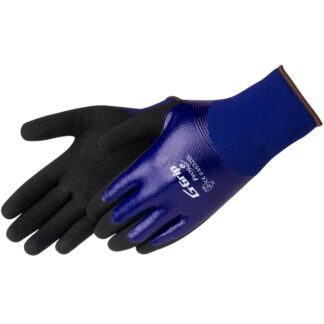 F4632BL
F4632BLG-Grip™
18 Gauge Blue Sandy Foam Nitrile Coated Seamless Gloves
-
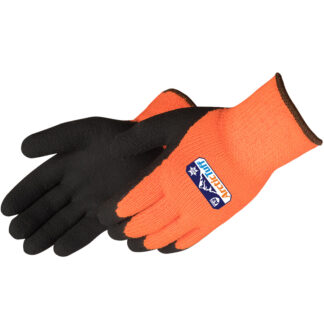 F4789HO
F4789HOArctic Tuff™
Black Foam Latex Coated Seamless Gloves
-
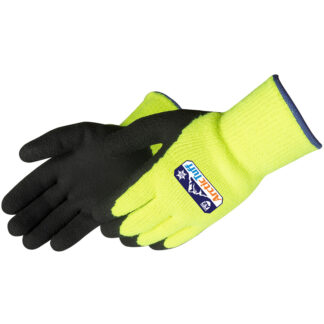 F4789LG
F4789LGArctic Tuff™
Black Foam Latex Coated Seamless Gloves
-
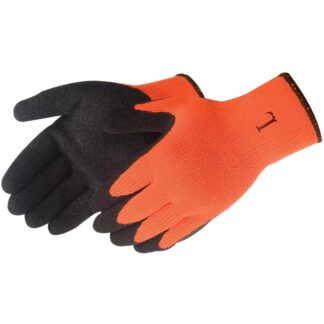 4729HO
4729HOA-Grip®
Black Latex Coated Seamless Gloves
-
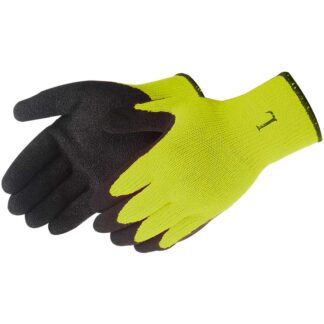 4729HY
4729HYA-Grip®
Black Latex Coated Seamless Gloves
-
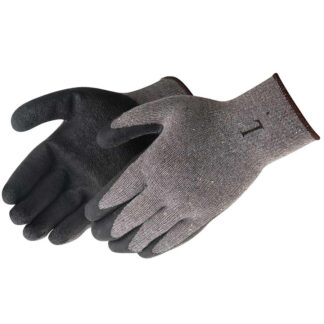 4729SP
4729SPA-Grip®
Black Latex Coated Seamless Gloves
-
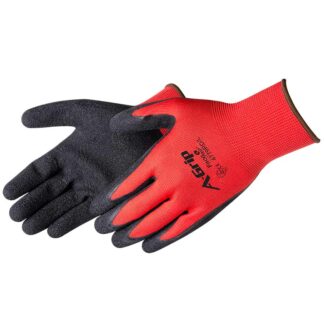 4779RD
4779RDA-Grip®
Black Latex Coated Seamless Gloves
-
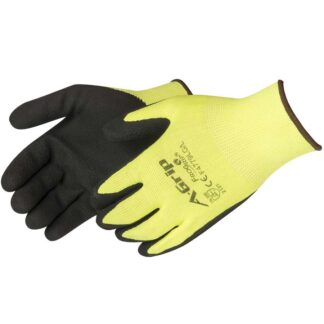 F4779LG
F4779LGA-Grip®
Black Latex Coated Seamless Gloves
-
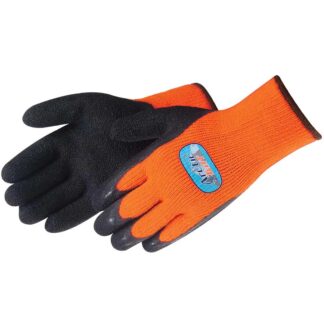 4789HO
4789HOArctic Tuff™
Black Latex Coated Seamless Gloves
-
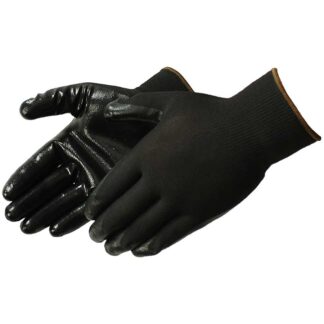 4631QBK
4631QBKQ-Grip®
Black Nitrile Coated Seamless Gloves
-
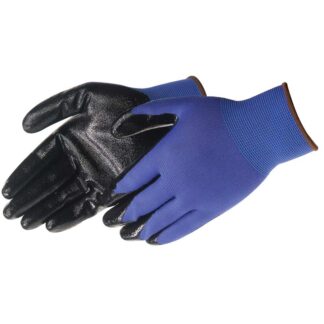 4631QBL
4631QBLQ-Grip®
Black Nitrile Coated Seamless Gloves
FAQ
The type of coating depends on the specific work task at hand. Coatings improve grip and enhance resistance against snags, abrasions, punctures, and tears while also providing protection against liquids or contaminants. The five standard coatings for Liberty Safety include Nitrile, Latex, Polyurethane (or PU), PVC (Polyvinyl Chloride), and Neoprene. The following chart provides a general overview of these coatings and their performance in different working conditions.
| Coating | Description |
| Nitrile, Foam Nitrile, and Sandy/Microfoam Nitrile | Nitrile-coated seamless gloves are a prevalent choice because they are durable and ideal for general-purpose work. As a material, Nitrile stands up well against tears and abrasions and withstands significant temperature differences. Foam Nitrile-coated seamless gloves are best used in wet or oily conditions because the coating works like a sponge and keeps the surface dry. This makes gripping with the gloves on a lot easier. Sandy Nitrile is known for its abrasion and higher resistance. It offers a tighter fit than other nitrile coatings. It works well in wet and oily environments. Microfoam Nitrile has a somewhat tacky finish and offers good breathability and flexibility. |
| Latex and Sandy Latex
|
Latex-coated gloves offer a fantastic grip and are often preferred over Nitrile when gripping in both wet and dry conditions is essential. Sandy latex provides a superior grip in wet or dry applications because of its grit. Outside workers appreciate how easy these gloves make grabbing bricks or hauling other building materials. |
| Polyurethane | Polyurethane, commonly called PU, increases puncture protection with only a thin coating. Though less durable than other coated seamless gloves, they offer a greater dexterity and grip because of the thinness of the PU coats. In addition, you can count on PU to enhance grip without being sticky while providing good resistance to oils and some chemicals. |
| PVC (Polyvinyl Chloride) | PVC-coated seamless gloves work well with adhesives and resist abrasions. Most adhesives do not stick to a glove’s surface with PVC, so they’re often used in an application where applying a sealant is necessary. In addition, PVC performs well in the cold and has a certain amount of abrasion resistance. |
| Neoprene | Neoprene is a synthetic rubber with good chemical stability and heat-resistant properties. Therefore, it resists oil and has exceptional dry, wet, and oily grip but has low abrasion resistance. As a result, it is often used for chemical resistance and self-extinguishing applications. |
Coated seamless gloves can be used for a variety of applications across various industries. The following chart provides a detailed overview of the Liberty Safety coated seamless glove range and the specific applications for which they are well-suited.
| Coating Seamless Glove | Applications |
| Arctic Tuff TM
*Available in latex, foam nitrile, or sandy foam nitrile coatings. |
|
| A-Grip ®
*Available in latex or sandy latex coatings. |
|
| G-Grip TM
*Available in nitrile, foam nitrile, micro-foam nitrile, and sandy nitrile coatings. |
|
| P-Grip®
*Available in polyurethane coating. |
|
| Q-Grip®
*Available in nitrile or foam nitrile coatings. |
|
| Coating Type | Description |
| Palm Coating | Palm coating refers to a glove where the coating is applied only to the palm and fingers area of the glove. The back of the hand and knuckles remain uncoated. |
| Fully Coated | In fully coated gloves, the entire glove, including the palms, fingers, knuckles, and back of the hand, is coated. This offers complete coverage and protection. |
| ¾ Back Coating | ¾ back coating refers to a glove where the coating is applied to the palm, fingers, and knuckles. The back of the hand remains uncoated. It balances protection and flexibility, allowing for better hand movement. |
| Double Dipped | Double-dipped gloves refer to the process of coating a glove twice, fully coated and palm coating. It enhances the durability and protective qualities of the glove. Double-dipped gloves are often used in applications requiring increased chemical or liquid resistance. |
A coated seamless glove is a type of work glove made from seamless knit fabric with a coating applied to it. The term “seamless” indicates that the glove is constructed without seams, providing a comfortable fit and reducing the risk of irritation or chafing.
The coating on a seamless glove serves various purposes, such as enhancing grip, providing additional protection against specific hazards, and improving durability. The type of coating can vary, and common materials include latex, nitrile, polyurethane, or PVC. Each coating material has its own set of characteristics, making the glove suitable for specific applications.
These gloves are popular in various industries, including manufacturing, construction, automotive, and general work environments. The seamless design ensures flexibility and dexterity, while the coating adds features such as abrasion resistance, chemical resistance, or grip, depending on the type of coating used.
It’s important to choose the right type of coated seamless glove based on the task’s specific requirements, considering factors such as the type of work, potential hazards, and comfort preferences.
The type of grip you can expect from coated gloves depends on the specific work task at hand. Different polymers excel in certain work environments, while others may be less effective. The following chart provides a general overview of various polymers used in coated gloves and their grip performance in different working conditions. The scale ranges from 0 to 5, with a higher score indicating better grip performance.
| Polymer | Abrasion | Acids | Dry | Oil | Water |
| Latex | 5 | 1 | 5 | 0 | 5 |
| Neoprene | 2 | 4 | 4 | 5 | 4 |
| Nitrile | 4 | 4 | 4 | 4 | 4 |
| Polyurethane | 3 | 1 | 4 | 1 | 4 |
| PVC | 3 | 3 | 3 | 3 | 3 |
Showing 1–20 of 49 results
